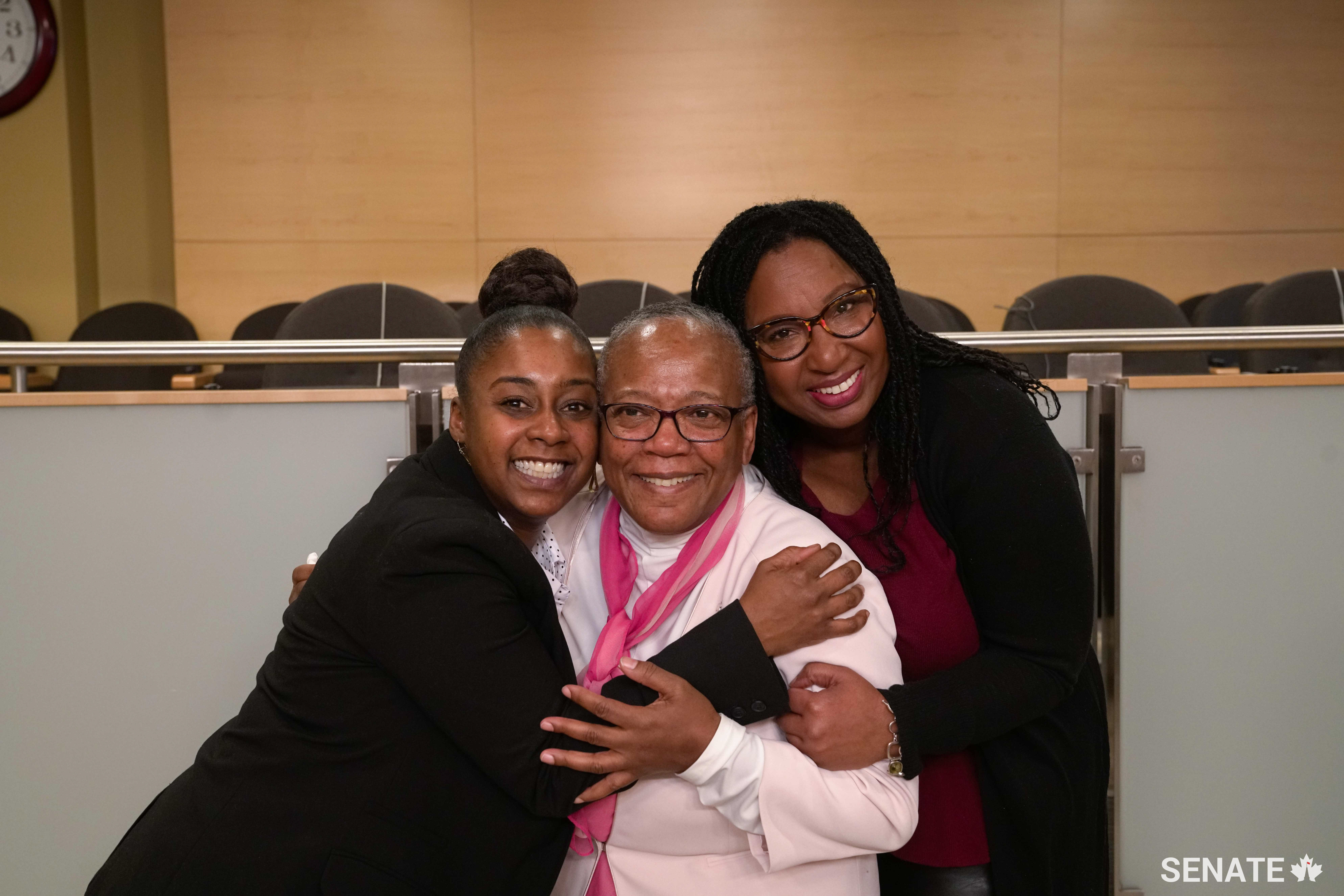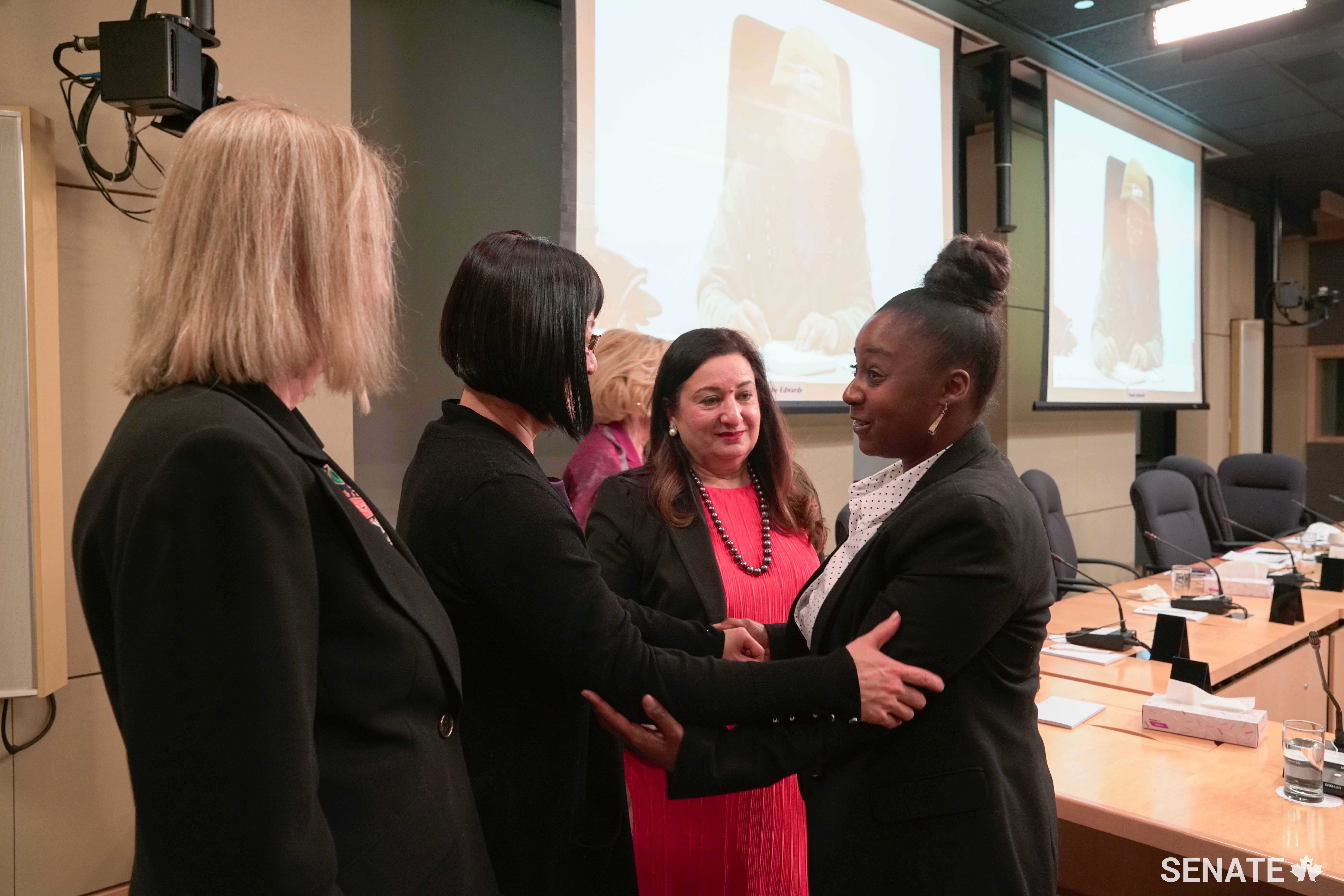Racism behind bars thwarts reform of Black prisoners, former prisoners tell committee

Racism jeopardizes Black prisoners’ chances of turning their lives around, two former federal prisoners told a special meeting of the Senate Committee on Human Rights Wednesday, February 14, 2018.
“There’s a lot of racism. There was a lot of violence and a lot of deception that was inside of the jail system itself,” said Natalie Charles, 39.
During the meeting, she and Denise Edwards described racism Black prisoners routinely encounter, a system that makes it difficult to lodge complaints about violent prisoners or guards and the demoralizing effect of solitary confinement.
Ms. Charles said prison officials will “deliberately” place prisoners they consider “troublemakers” on a range where they are more likely to be subjected to violence from other prisoners.
Ms. Edwards said racism is built-in to the correctional system “at its highest level” because prisons foster a culture in which Black and Indigenous prisoners are made to feel “their position (is) at the bottom of Canada’s political, social and economic hierarchy.”
Black people account for 8.6% of Canadian federally incarcerated persons but only 3% of the overall population.
“We’re terribly over-represented in the prison system. And there are reasons for that. We don’t get up and want to commit crime,” said Ms. Edwards, a 52-year-old University of Toronto student who took advantage of the prison’s Walls to Bridges program to begin earning university credits.
In recognition of Black History Month, the committee dedicated its February 14 meeting to hearing evidence about conditions Black prisoners face. That discussion is part of the committee’s broader examination of the rights of prisoners that began in 2016.
“Since we started this study, we are realizing that things need to change. There needs to be more help and support,” deputy chair Senator Salma Ataullahjan said.


Ms. Edwards commended the women on the committee for going through “extra hoops” required of women who want to succeed in politics but singled out chair Senator Wanda Thomas Bernard — who is African-Nova Scotian — for being “double smart, double tenacious and extremely durable” to get where she is.
“I have absolutely walked a mile, lived a year in your life, lived a year in your skin, lived my whole life struggling with the very issues that you’ve identified,” Senator Bernard replied.
Ms. Charles’ and Ms. Edwards’ testimony will help the committee write recommendations to the government aimed at reforming prisons, deputy chair Senator Jane Cordy said.
“It’s when we can hear the stories from individuals that we know that we have to make recommendations that make a difference,” she said.
A second special meeting on February 28 will focus on the United Nations’ Proclamation of the International Decade for People of African Descent and what it means for Canada.
Related articles
Tags
Committee news
Racism behind bars thwarts reform of Black prisoners, former prisoners tell committee

Racism jeopardizes Black prisoners’ chances of turning their lives around, two former federal prisoners told a special meeting of the Senate Committee on Human Rights Wednesday, February 14, 2018.
“There’s a lot of racism. There was a lot of violence and a lot of deception that was inside of the jail system itself,” said Natalie Charles, 39.
During the meeting, she and Denise Edwards described racism Black prisoners routinely encounter, a system that makes it difficult to lodge complaints about violent prisoners or guards and the demoralizing effect of solitary confinement.
Ms. Charles said prison officials will “deliberately” place prisoners they consider “troublemakers” on a range where they are more likely to be subjected to violence from other prisoners.
Ms. Edwards said racism is built-in to the correctional system “at its highest level” because prisons foster a culture in which Black and Indigenous prisoners are made to feel “their position (is) at the bottom of Canada’s political, social and economic hierarchy.”
Black people account for 8.6% of Canadian federally incarcerated persons but only 3% of the overall population.
“We’re terribly over-represented in the prison system. And there are reasons for that. We don’t get up and want to commit crime,” said Ms. Edwards, a 52-year-old University of Toronto student who took advantage of the prison’s Walls to Bridges program to begin earning university credits.
In recognition of Black History Month, the committee dedicated its February 14 meeting to hearing evidence about conditions Black prisoners face. That discussion is part of the committee’s broader examination of the rights of prisoners that began in 2016.
“Since we started this study, we are realizing that things need to change. There needs to be more help and support,” deputy chair Senator Salma Ataullahjan said.


Ms. Edwards commended the women on the committee for going through “extra hoops” required of women who want to succeed in politics but singled out chair Senator Wanda Thomas Bernard — who is African-Nova Scotian — for being “double smart, double tenacious and extremely durable” to get where she is.
“I have absolutely walked a mile, lived a year in your life, lived a year in your skin, lived my whole life struggling with the very issues that you’ve identified,” Senator Bernard replied.
Ms. Charles’ and Ms. Edwards’ testimony will help the committee write recommendations to the government aimed at reforming prisons, deputy chair Senator Jane Cordy said.
“It’s when we can hear the stories from individuals that we know that we have to make recommendations that make a difference,” she said.
A second special meeting on February 28 will focus on the United Nations’ Proclamation of the International Decade for People of African Descent and what it means for Canada.


